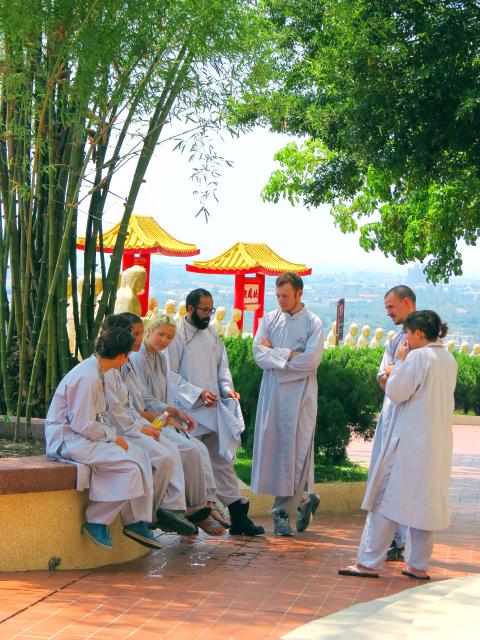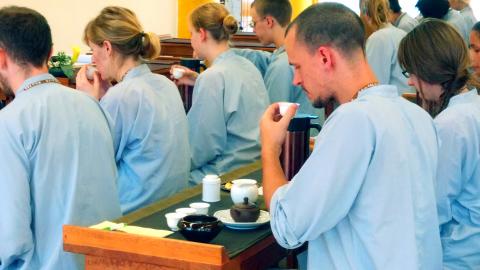Fo Guang Shan’s (佛光山) weekend retreat for English speakers is an integrated program, with guests eating and doing chores with the monks and nuns of its lush mountaintop monastery.
Before daybreak, retreaters file into the main shrine to chant morning sutras with the rest of the order.
At 6:30am, it’s chow time. Each guest and resident takes a seat at a long table, facing a little plate of vegetables, a bowl of rice and another of soup. They eat in silence, one ruminating bite at a time.

Photo Courtesy of Fo Guang Shan
They engage in the “five contemplations” while tasting the food: practicing gratefulness, considering each dish as equal to all the others, guarding the mind against greed, treating the meal as a salve to the body and, finally, meditating on how the food is facilitating their self-cultivation.
It is not a wild time in the traditional sense, but the temple retreat for English speakers has had a good year since its launch last May.
An enthusiastic public reception has enabled the far-flung monastery to run an unbroken schedule of retreats, once on the second weekend of every month.

Photo Courtesy of Fo Guang Shan
“The attendance has been quite stable. We sometimes get between 18 and 22 people, but most of the time we go up to 30. That’s surprising for us. We weren’t sure how many people would be interested,” said Venerable Miao Guang (妙光), program creator and coordinator.
“Foreign visitors who come to the temple — quite often they will ask if there is already a program like this where they can live in the temple and live with the rest of the community and experience monastic life,” she said.
Interest is so high that organizers are now eyeing two regular retreats, one for beginners and one for intermediate retreaters, “who can learn about Buddhism or Dharma in greater depth,” she said.
For beginners, Fo Guang Shan’s dense foliage and long stretches of silence are mainly a respite from the pressures of modern life.
“When they come into the monastery dining hall, we ask them to slow down … They realize how scattered their mind can be during their regular days. When they actually sit down, they become much clearer with what they are thinking,” she said.
PROGRAM
Fo Guang Shan, Taiwan’s largest Buddhist organization, held the first retreat last May after a raft of requests from foreign exchange students who wanted to live in the monastery.
For a year now, the form of the retreat has been largely unaltered: Each event is three days and two nights of simple living and lessons in English taught by monastery residents.
Each retreat features an English-language workshop on Buddhist culture. One month it is a workshop on sutra calligraphy. Another month, it is Chinese painting, Buddhist music appreciation or vegetarian cooking.
In the upcoming event from May 16 to 18, pilgrims will learn tea chan (禪), a Buddhist tea ceremony that is an exercise in mindfulness, she said.
Each retreat also includes a longer lecture in English. This month, the talk is on conditionality, or the law of cause and effect.
“What determines your future is actually what you do now. If you plant a mango seed, in the future you will get a mango tree,” she said.
The weekend retreat is part of Fo Guang Shan’s broader effort to open the gates of its southern Taiwan headquarters to the international community.
Last year, the order rolled out an annual 3-day English-language workshop, aimed at former retreaters who wished to live in the meditation hall and hone their meditation skills.
In 2010, Fo Guang Shan launched the International Youth Seminar on Life and Ch’an, a free-of-charge summer program for the 18- to 35-year-old set. The program, which has drawn over 1,000 students annually, is slated for July 10 to July 23.

On the evening of June 1, Control Yuan Secretary-General Lee Chun-yi (李俊俋) apologized and resigned in disgrace. His crime was instructing his driver to use a Control Yuan vehicle to transport his dog to a pet grooming salon. The Control Yuan is the government branch that investigates, audits and impeaches government officials for, among other things, misuse of government funds, so his misuse of a government vehicle was highly inappropriate. If this story were told to anyone living in the golden era of swaggering gangsters, flashy nouveau riche businessmen, and corrupt “black gold” politics of the 1980s and 1990s, they would have laughed.

When Lisa, 20, laces into her ultra-high heels for her shift at a strip club in Ukraine’s Kharkiv, she knows that aside from dancing, she will have to comfort traumatized soldiers. Since Russia’s 2022 invasion, exhausted troops are the main clientele of the Flash Dancers club in the center of the northeastern city, just 20 kilometers from Russian forces. For some customers, it provides an “escape” from the war, said Valerya Zavatska — a 25-year-old law graduate who runs the club with her mother, an ex-dancer. But many are not there just for the show. They “want to talk about what hurts,” she

It was just before 6am on a sunny November morning and I could hardly contain my excitement as I arrived at the wharf where I would catch the boat to one of Penghu’s most difficult-to-access islands, a trip that had been on my list for nearly a decade. Little did I know, my dream would soon be crushed. Unsure about which boat was heading to Huayu (花嶼), I found someone who appeared to be a local and asked if this was the right place to wait. “Oh, the boat to Huayu’s been canceled today,” she told me. I couldn’t believe my ears. Surely,

This is a deeply unsettling period in Taiwan. Uncertainties are everywhere while everyone waits for a small army of other shoes to drop on nearly every front. During challenging times, interesting political changes can happen, yet all three major political parties are beset with scandals, strife and self-inflicted wounds. As the ruling party, the Democratic Progressive Party (DPP) is held accountable for not only the challenges to the party, but also the nation. Taiwan is geopolitically and economically under threat. Domestically, the administration is under siege by the opposition-controlled legislature and growing discontent with what opponents characterize as arrogant, autocratic